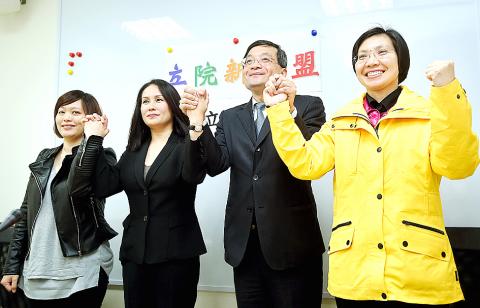Four legislators yesterday announced the launch of a new legislative caucus — the Legislative Yuan New Alliance (LYNA, 立院新聯盟) — vowing to serve as the “adhesive” between the pan-green and pan-blue political camps.
The group’s four founding members are two legislators from the People First Party (PFP) — Thomas Lee (李桐豪) and Chen Yi-chieh (陳怡潔) — as well as Non-Partisan Solidarity Union Legislator May Chin (高金素梅) and Legislator Hsu Hsin-ying (徐欣瑩) a former Chinese Nationalist Party (KMT) member.
Lee, the convener of the group, said the new caucus would focus on reforms to the Constitution, as well as an oversight bill to monitor future cross-strait treaties.

Photo: Fang Pin-chao, Taipei Times
Although all four members of the LYNA have traditionally been affiliated with the pan-blue camp, the group said it welcomed members of both the blue and green camps to join their discussions.
Hsu made headlines last month when she announced her withdrawal from the KMT, saying that she wanted to present an alternative option to the public as an independent.
Hsu said that the public was primarily against the proposed cross-strait service trade agreement because it was perceived as a “black box” deal that bypassed legislative deliberation.
She said that both major political camps should discuss potential cross-strait treaties in detail in a way that is acceptable to the public.
She added that Taiwan could not afford to cut off economic relations with China.
Chen said Taiwan should not boycott cross-strait trade pacts, but evaluate each clause carefully.

Alain Robert, known as the "French Spider-Man," praised Alex Honnold as exceptionally well-prepared after the US climber completed a free solo ascent of Taipei 101 yesterday. Robert said Honnold's ascent of the 508m-tall skyscraper in just more than one-and-a-half hours without using safety ropes or equipment was a remarkable achievement. "This is my life," he said in an interview conducted in French, adding that he liked the feeling of being "on the edge of danger." The 63-year-old Frenchman climbed Taipei 101 using ropes in December 2004, taking about four hours to reach the top. On a one-to-10 scale of difficulty, Robert said Taipei 101

Nipah virus infection is to be officially listed as a category 5 notifiable infectious disease in Taiwan in March, while clinical treatment guidelines are being formulated, the Centers for Disease Control (CDC) said yesterday. With Nipah infections being reported in other countries and considering its relatively high fatality rate, the centers on Jan. 16 announced that it would be listed as a notifiable infectious disease to bolster the nation’s systematic early warning system and increase public awareness, the CDC said. Bangladesh reported four fatal cases last year in separate districts, with three linked to raw date palm sap consumption, CDC Epidemic Intelligence

Taiwanese and US defense groups are collaborating to introduce deployable, semi-autonomous manufacturing systems for drones and components in a boost to the nation’s supply chain resilience. Taiwan’s G-Tech Optroelectronics Corp subsidiary GTOC and the US’ Aerkomm Inc on Friday announced an agreement with fellow US-based Firestorm Lab to adopt the latter’s xCell, a technology featuring 3D printers fitted in 6.1m container units. The systems enable aerial platforms and parts to be produced in high volumes from dispersed nodes capable of rapid redeployment, to minimize the risk of enemy strikes and to meet field requirements, they said. Firestorm chief technology officer Ian Muceus said

MORE FALL: An investigation into one of Xi’s key cronies, part of a broader ‘anti-corruption’ drive, indicates that he might have a deep distrust in the military, an expert said China’s latest military purge underscores systemic risks in its shift from collective leadership to sole rule under Chinese President Xi Jinping (習近平), and could disrupt its chain of command and military capabilities, a national security official said yesterday. If decisionmaking within the Chinese Communist Party has become “irrational” under one-man rule, the Taiwan Strait and the regional situation must be approached with extreme caution, given unforeseen risks, they added. The anonymous official made the remarks as China’s Central Military Commission Vice Chairman Zhang Youxia (張又俠) and Joint Staff Department Chief of Staff Liu Zhenli (劉振立) were reportedly being investigated for suspected “serious